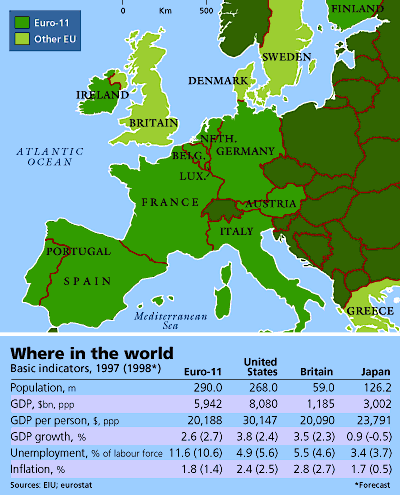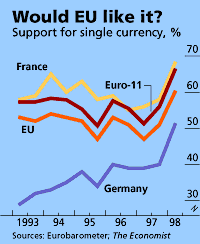
EURO BRIEF
The power of eleven
We conclude our series of euro briefs by recalling that economic and monetary union (EMU) was conceived by politicians for political ends. Their main purpose was not to raise economic efficiency—but to change the way Europe was governed
Out of the loop
The euro
Search archive
The 11 countries that have now signed up for the project see it serving their national interests in different ways. France has long wanted to get its hands on some of the economic power wielded by the German Bundesbank. It has suited Germany to indulge France, especially since German unification. By swapping the D-mark for the euro Germany is proving to nervous neighbours its continuing commitment to European integration. France and Germany still see a united Europe—whatever that means—as the best vehicle for advancing their interests in the world at large.
The determination of France and Germany to pursue monetary union has meant that other countries have faced a more limited calculation. They have not been asked to decide whether the single currency is a good idea; only to decide whether to join a project that would go ahead anyway. Not surprisingly, most have chosen to be in not out.
The decision was easy for the Benelux countries. Belgium, the Netherlands and Luxembourg were founder members of the European Economic Community (predecessor of the European Union), with France, West Germany and Italy. They have been consistent supporters of European integration, partly because they depend heavily on intra-EU trade, and partly because the tide of history has left them with few illusions about the worth of national frontiers.
Germany accounts for a quarter of the foreign trade of the Netherlands. The guilder has been tied closely to the D-mark since 1979. The Dutch were critical of the emerging shape of monetary union, but not of its desirability in principle. The Dutch wanted to be sure that the interests of Europe’s smaller countries would not be ignored in a project dominated by France and Germany. It pleased almost everybody that a Dutchman, Wim Duisenberg, was chosen to run the new European Central Bank—despite a last-minute French attempt to insert a Frenchman into the job.
Belgium has been even keener to reinforce its European “identity” since its national identity started falling apart seriously in the 1980s. Deepening divides between a French-speaking south and a Dutch-speaking north have transformed Belgium from a unitary state into a federated one. European integration is one of the few goals on which the whole country can agree. The Belgians also found the euro a useful outside discipline that helped them to force through unpopular measures to control their public finances.
Club Med worries
If Belgium had problems, Italy seemed an even less obvious candidate for the euro. It has a poor record of fiscal and monetary discipline, a notoriously ineffective political system, and wide regional disparities. For a long time it seemed likely to be a candidate for later entry, after the new system had bedded down. But Italians feared that failure to join with France and Germany would reduce their country to small-country status within the European Union. Many Italians also see EMU as a good way to entrench price stability and put control of their economy in safer (non-Italian) hands.
Hence the broad political consensus in Italy in favour of early entry at any cost. Enlightened politicians and central-bank technocrats found a surprising measure of popular support for the fiscal reforms needed to qualify for monetary union. The struggle to get borrowing down, tax revenues up and public debt on a falling trajectory—much of it undertaken in 1996-97 by the centre-left “Olive Tree’’ coalition led by Romano Prodi—has been a painful but inspiring sight.
There was little help for the Italians from elsewhere. Because the idea of sharing a currency with Italy has been anathema to German (and Dutch) public opinion, German politicians have gone out of their way to insist on rigid application of the EMU entry rules. Spain and Portugal, even though their interests are often grouped with Italy’s in a jocularly named “Club Med”, have kept their distance, the better to advertise the healthier state of their own public finances.

